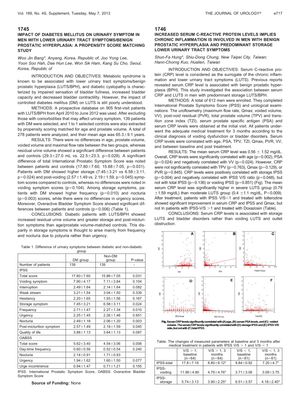Increased Serum C-Reactive Protein Levels Imply Chronic Inflammation in Men with Benign Prostatic Hyperplasia and Predominant Storage Lower Urinary Tract Symptoms
April 2013
in “
The Journal of Urology
”

TLDR Higher CRP levels suggest chronic inflammation is linked to bladder-related urinary symptoms in men with enlarged prostates.
The study from April 2013 involved 612 men with benign prostatic hyperplasia (BPH) and examined the link between serum C-reactive protein (CRP) levels and lower urinary tract symptoms (LUTS), particularly storage symptoms. The findings indicated a significant correlation between higher CRP levels and storage symptoms, as well as with age and prostate specific antigen (PSA), but not with total or voiding symptoms. Treatment with tolterodine in patients with a voiding/storage ratio less than 1 led to a significant reduction in CRP levels and symptom improvement, whereas treatment with Doxazosin in those with a ratio greater than 1 did not yield significant changes. The study concluded that increased serum CRP levels suggest chronic inflammation is more related to storage LUTS and bladder disorders than to voiding LUTS and outlet obstruction.





